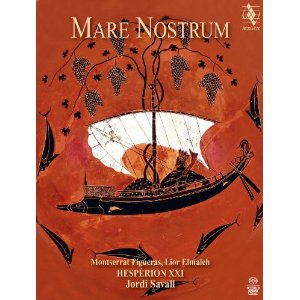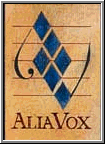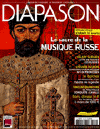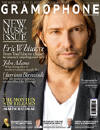 Extraits:
Extraits:
"Les
civilisations et les peuples de "Notre Mer" se sont forgés à
partir de deux grands fleuves indépendants mais toujours
communicants ; les invasions et migrations et les développements
des trois principales religions"
"...la Méditerranée c'est aussi l'histoire de la mythologie, de la
philosophie, des anciennes croyances, de la pensée spirituelle et
des conflits très étroitement liés aux trois principales religions
monothéistes : judaïsme, christianisme et islam"
"Sur le plan humain, le visage actuel de la Méditerranée est
d'abord l'œuvre de trois grands ensembles de mouvements
migratoires, échelonnés sur plus de trois millénaires. Le premier
et le plus long, de l'an 2000 avant notre ère jusqu'à la fin des
invasions barbares, peuple les péninsules et les rivages du nord ;
Hittites, Grecs, Italiques et Celtes d'est en ouest, puis après
l'échec de Rome à les contenir, les Francs, les Lombards et les
Slaves".
"Les deux autres mouvements migratoires sont, toujours selon
Maurice Aymard, l'œuvre de deux groupes, plus restreints sans
doute en nombre, de grands nomades : Arabes et Turcs. Les premiers
déferlent à partir du VIIe siècle depuis leurs déserts tropicaux
du Proche-Orient, bousculent la résistance affaiblie de Byzance,
imposant en deux siècles, de Bagdad à Gibraltar, leur foi toute
neuve et leur langue, débordent même au nord, occupent l'Espagne
et la Sicile, et ravagent les côtes d'Italie et de France. Venus
des steppes froides de l'Asie centrale, le seconds s'installent en
Anatolie à partir du XIe siècle : trois siècles plus tard l'Etat
des Osmanlis réussit à s'établir solidement dans les Balkans avant
de s'emparer de Constantinople, puis soumettre, jusqu'à Alger tout
l'islam méditerranéen. Istanbul réussit ce paradoxe de devenir, à
l'époque de Soliman le Magnifique, la première ville turque, mais
aussi la première ville grecque, arménienne et juive… Nulle trace,
il est vrai, de conversion forcée : les "infidèles" ont partout
leur place, confirmée par un impôt spécial. La césure fondamentale
oppose désormais non le Nord et le Sud, mais l'Orient et
l'Occident".
"...laissons parler l'histoire, pour mieux comprendre le sens de
nos origines et de nos tragédies, de nos conflits et de nos
espoirs, et laissons sonner la musique, pour nous faire sentir,
grâce au dialogue des voix et des instruments, combien l'infinie
richesse de notre diversité musicale "méditerranéenne" peut être
une source inépuisable d'émotions et de beauté, de dialogues et de
découvertes. Nous pensons comme Amin Maalouf que "Pour redonner à
notre humanité déboussolée quelques signes d'espoir, il faut aller
bien au-delà d'un dialogue des cultures et des croyances, vers un
dialogue des âmes. Telle est, en ce début du XXIe siècle, la
mission irremplaçable de l'art".
JORDI SAVALL
New York, 10/15 d'Octobre 2011
Version imprimable -
(Cliquer ici)
~~~~~~~~~~~~~
 Excerpts:
Excerpts:
"The
civilisations and peoples of “Our Sea” were forged out of two
great independent but always mutually permeable flows: invasions
and migrations and the development of the three major religions".
"In
human terms, the modern-day Mediterranean is primarily the work of
three great migratory movements, spread out over more than three
thousand years. The first – and also the longest, from the year
2000 before our era until the end of the barbarian invasions,
populated the peninsulas and the Northern shores: Hittites,
Greeks, Italic and Celtic peoples from East to West, and then,
following Rome’s failure to contain them, the Franks, the Lombards
and the Slavs. All these invasions took their toll in terms of
brutal upheaval and large-scale devastation, followed by long
periods of regression. The destruction, in the 12th century before
our era, of the Achaean kingdoms of Mycene and Argos by a second
wave of Greek invaders, the Dorians, marked the beginning of a
Middle Ages comparable to that which ensued after the collapse of
Rome in the face of the barbarian onslaught".
"The
other two migratory movements described by Maurice Aymard
are attributable to two groups, no doubt smaller in number
than the first, of great nomadic peoples: the Arabs and the
Turks. From the 7th century the former spread out from their
tropical deserts in the Middle East, toppled the weakened
resistence of Byzantium and, over the ensuing two centuries,
imposed their brand new faith and their language from
Baghdad to Gibraltar, even overrunning the North, occupying
Spain and Sicily and ravaging the coasts of Italy and
France. The latter emerged from the cold steppes of central
Asia to settle in Anatolia in the 11th century: three
hundred years later, the Osmanli state had successfully
established itself in the Balkans before going on to seize
Constantinople, and subsequently bringing the whole of
Mediterranean Islam, as far as Algiers, under its control.
Under Suleyman the Magnificent, Istanbul paradoxically
became not only the capital city of Turkey, but also the
foremost Greek, Armenian and Jewish city… It has to be said
that there was no trace of forced conversion: “infidels”
were free to live in the Empire, as is confirmed by the
special tax, the jizya, that was levied on non-Muslims.
Henceforth, the major rift was to be not between North and
South, but between East and West".
"Let
us allow history to help us gain a better understanding of
our origins and tragedies, of our conflicts and our hopes.
And let us allow music, through the dialogue of voices and
instruments, to show us how the infinite richness of our
“Mediterranean” musical diversity can provide an
inexhaustible source of emotions and beauty, of dialogues
and discoveries. Like Amin Maalouf, we believe that “If we
are to restore some hope to our disoriented humanity, we
must go beyond a mere dialogue of cultures and beliefs
towards a dialogue of souls. As we stand at the beginning of
the 21st century, that is the irreplaceable mission of Art.”
JORDI SAVALL
New York, 10/15- October 2011
Translated by Jacqueline Minett
Printable version -
(Click here)







